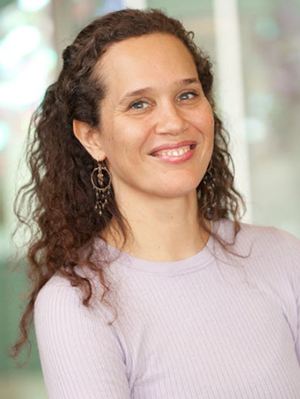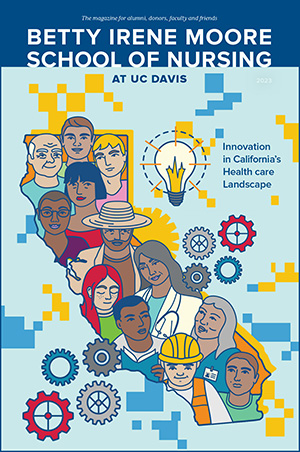Meet Piri Ackerman-Barger
Clinical professor opens minds and hearts of students for improvement of health disparities
 Piri Ackerman-Barger is committed to improving health disparities and helping nursing students further their compassion.
Piri Ackerman-Barger is committed to improving health disparities and helping nursing students further their compassion.
Piri Ackerman-Barger is committed to improving health disparities and helping nursing students further their compassion.
As a young girl growing up in Humboldt County in Northern California, Piri Ackerman-Barger admired the health care leaders in her community and sensed she would follow in their footsteps. Today, this seasoned intensive care unit nurse and nursing school educator brings her vast experience in prelicensure programs and dedication to health equity to the clinical nursing programs at the Betty Irene Moore School of Nursing at UC Davis and offers students the academic mastery necessary to be health-care leaders and grows the human compassion needed to fairly and effectively serve all kinds of people.
“Most nursing school programs focus too much on the ability of graduates to pass a standardized test, the NCLEX, at the end of the program,” Ackerman-Barger said. “We desire programs where students get great scores, but also understand the continuum of care. We can’t focus on just the diagnosis. We must understand the person, the family and the community experiencing that health condition.”
“Piri proactively creates an inclusive culture at the school, supports students to promote their success and remains accessible to students, faculty and staff in ways to build community,” explained Executive Associate Dean Theresa Harvath. “Her commitment to health equity is unwavering and her experience in acute-care settings complements my community-based perspective.”
Ackerman-Barger is nationally recognized for her envelope-pushing style that empowers students to grasp foreign concepts in classroom instruction and clinical experience with different cultures. They concur that students from underserved or rural areas who enroll in the program will benefit from her expertise, in order to serve their home communities better when they return.
Prior to joining the School of Nursing, Ackerman-Barger taught as an assistant professor in nursing at Humboldt State University in Arcata, California. Before teaching, Ackerman-Barger was a hospital nursing administrative supervisor and critical care and emergency department charge nurse.
“I loved caring for people and their families. Then, when I served as a mentor for nursing students in a hospital intensive care unit, aspects of my work that had grown mundane grew exciting again,” said Ackerman Barger, who is also an assistant clinical professor at the School of Nursing. “Sharing my passion with students fulfilled me, so a career segue into nursing education was a natural trajectory.”
The School of Nursing attracted Ackerman-Barger with its innovative approach to education and focus on interprofessional collaboration. “Silence Kills,” a 2005 study by VitalSmarts-American Association of Critical-Care Nurses, underscored how the lack of clear communication between nurses and physicians leads to avoidable errors and even death. The reality that well-intentioned people in health-care institutions choose not to speak up when they’re concerned with behavior, decisions or actions of a colleague or intimidated by a higher-level professional is a phenomenon that School of Nursing methods address throughout the curriculum. The curriculum includes opportunities for students to learn and practice evidence-based techniques that improve communication with colleagues in order to avoid misunderstandings that can result in serious errors.
“Early in their careers, students and nurses sometimes do not feel authorized to speak up when they have concerns,” added Harvath. “They may assume that others know more than they do or have more authority that should not be questioned. Our curriculum provides opportunities for students to practice speaking up, even when they believe that a power or knowledge differential exists, in order to effectively advocate for the person who is receiving care and his or her family.”
“I feel privileged to be on the teaching side now and able to bring out the students’ best potential and channel their passion into caring for people,” Ackerman-Barger added. “I hope to foster mutual support among nurses and other health-care professionals and create an atmosphere of congeniality toward those in our care. Too many times I’ve seen professionals be cruel or insensitive to people and anything I can do to mitigate that behavior and increase compassion and understanding is my life’s work.”





